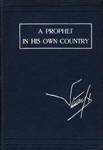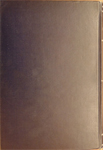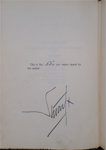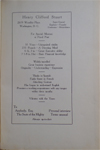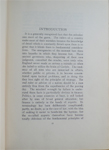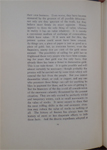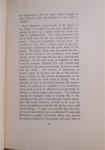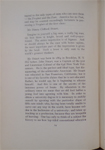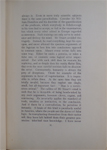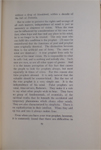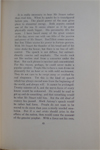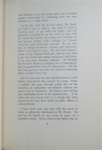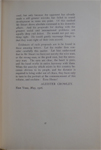100th
MP

|
THE
100th
MONKEY
PRESS |
|
|
|
Limited Editions by Aleister Crowley & Victor B. Neuburg |
|
Bibliographies |
|
Download Texts
»
Aleister
Crowley
WANTED !!NEW!!
|
|
A PROPHET IN HIS OWN COUNTRY (Introduction and Notes Only) |
|
|
|
Image Thumbnails |
||||||
|
Title: |
A Prophet In His Own Country. (Introduction and Notes Only) |
|
||||||
|
Author: |
Henry Clifford Stuart. |
|||||||
|
Variations: |
|
|||||||
|
Publisher: |
Privately published by the author.2 |
|||||||
|
Printer: |
J. B. Lyon Company, Albany, New York. |
|||||||
|
Published At: |
2619 Woodley Place, N.W. , Washington, D.C.2 |
|||||||
|
Date: |
June 1916.3 |
|||||||
|
Edition: |
1st Edition. |
|||||||
|
Pages: |
499.1 |
|||||||
|
Price: |
|
|||||||
|
Remarks: |
The 16-page introduction was written by Crowley in June 1916 while in New York.3 He also contributed numerous notes to the book. Has a signed frontispiece of Henry Clifford Stuart by Senseney.2 |
|||||||
|
Pagination: |
|
|||||||
|
Contents: |
- Author’s Key-Note - Introduction - The Dollar - China - The War - Aunt Margery - Miscellaneous - Epilogue - Index |
|||||||
|
Author’s Working Versions: |
|
|||||||
|
Other Known Editions: |
|
|||||||
|
Bibliographic Sources: |
|
|||||||
|
Comments by Aleister Crowley: |
|
|||||||
|
Reviews: |
Views and Reviews.
NOT WITHOUT HUMOUR.
“A Prophet In His Own Country.” By Henry Clifford Stuart. With a Preface by Aleister Crowley. (Author’s Edition.)
To be introduced and annotated by Mr. Aleister Crowley is a distinction that most prophets have been unable to obtain. This is not the fault of Mr. Crowley; the internal evidence of this book suggests to me that he would be willing to introduce anybody as a prophet; but either prophets are rare in America, or they avoid introductions by, perhaps even to, Mr. Crowley, for the fact remains that it is Mr. Stuart, and no other, whose work is recommended to us. “I have never yet met a stupid American,” says Mr. Crowley. “But Mr. Stuart is almost the only one whom I have met who was not silly.” It is a dubious distinction; apparently prophecy, like religion, requires darkness to shine in. In the land of the silly, the one who is just “not silly” is a prophet. Oh, the little more, and how much it is! And the little less, and what worlds away! Mr. Stuart moves in a different world from the Americans, and the English; we are material, he is “spiritual” like the Germans, as he discovered after reading Bernhardi. We think words, vain “words, words, words,” as Hamlet said, and they are words without meaning. “The people say. What say they? Let them say.” But Mr. Stuart senses “things”; when he wants to know what will happen, he becomes God and says so. “Things” are “in the air,” there is Mr. Stuart inhaling and exhaling like the ventilating system on the Tube. “Air! Give me air!” he cries; and as I have nothing else to give him, I do so freely. I may be wrong about the air; perhaps it is not pneuma but spiritus that is Mr. Stuart’s daily food; but whatever it is, it blows him out, and he wants a lot of it. The form taken by Mr. Stuart’s expiration is that of letters to all sorts of people and papers. Seest thou a man going wrong in his business? Mr. Stuart will breathe upon him. He breathes upon everybody, from Sun-Yat-Sen to President Wilson, about something that he calls Fine-ance. On this point, the python on his tripodess is no more profound, and far less clear, than the Banking and Currency Reform League, who do not, I believe, lay claim to any divine inspiration or spiritual contact with the unseen. Mr. H. G. Wells, too, has written a novel called “The Sleeper Wakes,” working out the same argument to a different conclusion; and he has not claimed any divine inspiration, indeed, he has confessed that he suffered from brain-fag when he wrote the book, and has apologised for the manifest signs of that fatigue. Mr. Stuart’s sensibility to this “thing” tells us nothing that is new, and we are not really compensated for the lack of novelty by the style in which his revelations are expressed. Mr. Crowley certainly says: “Mr. Stuart’s style is as difficult as Wagner’s or Whistler’s were to their contemporaries”: perhaps Mr. George Bernard Shaw thought so when he received (if he did receive) the following letter on November 15, 1914: “Master Shaw:——I have given the greater part of my leisure for the day to the consideration of your article in the ‘New York Times.’ “Easily —— Well done! “Part of a sentence —— one phrase alone; —— —— money, the only commodity the moneyed class has to sell’ —— would recompense me for my time.” We can imagine Mr. Shaw sitting up and taking notice when this letter reached him, and saying: “Great Collectivism! this man pierces straight to the heart of things.” Mr. Crowley says something similar on many occasions when Mr. Stuart is no more profound than this. For example, when Mr. Stuart writes, in free rhythm, a dialogue between himself and Professor Fisher, and in reply to Professor Fisher’s advocacy of “an unshrinkable dollar” says:
Such a statement is only possible to the mathematical mind. None other can conceive of anything FIXED— All others look behind, around, and ahead; and perceive that man has not only always failed to fix things himself but has never found anything fixed, nor does his vision, roam where it will in Heaven or Earth, find anything fixed;-- All is flux— The very tombstones fail to fix the “Dead.”
Mr. Crowley puts one of his inevitable notes to the rhapsody: “This argument is extraordinarily subtle and profound, and cuts at the roots of the matter of exchange. The triumphant conclusion in the Panta Rei of Heraclitus stamps this dialogue as great literature.—A.C.” Oh! Crowley, Crowley! But this is a mere trifle of commendation to Mr. Crowley; he does not stint his praise. On January 22, 1911, Mr. Stuart wrote:
Dr. Hannah Thompson pictures the faculty of sight and the organs of sight as separate and distinct. We know what poor instruments our organs are. May it not be that “The Heavens” are right before us in plain sight, were our organs only suitable for seeing them? When we do see them it will be thro’ the spiritualisation of the faculty of sight— And may not some highly spiritual natures already so see them? And if they did—would they inform scoffers? Our spiritual natures are far from developed yet.
That is not the sort of message that would make one say: “Hail Columbia! Bird thou never wert!” But Mr. Crowley says: “There is an extraordinary resemblance between the author of these letters and William Blake (according to the frontispiece, Mr. Stuart looks more like Andrew Carnegie); which extends not only to the quality of the vision, but to their styles. There is the same curious difficulty about reading them, a sort of feeling that one is uncertain of the real meaning of the thought. And this is not a mere question of the connotation of the words used; it is a sort of fundamental misgiving as to whether one’s mind is sufficiently in tune to be able to apprehend. If there be anything in the theory of re-incarnation, it is a good bet that Mr. Stuart is William Blake come back.” If this be so, let us hope that there is nothing in the theory of re-incarnation or that, if there is, William Blake will come in any shape but this. Among the minor prophecies, this may be quoted; dated August 23, 1914: “Physically, England is degenerate ——. She cannot put an army of any size or fighting quality in the field any longer.” Poor old England! Dead, isn’t she? Anyhow, win or lose, England will pass, says Mr. Stuart; the war will last three years, then the debts will be repudiated, then we shall have class wars for seven years, and then the white races, the only savages on earth, will be destroyed by the yellow races. Gold will be the cause of our downfall, and if I may remark a subtlety that Mr. Crowley has over-looked, I should like to point out that Mr. Stuart’s prophecies of calamity are arranged on a colour-scheme. Our unstable civilisation is built upon gold; gold is a shade of yellow, and yellow is the colour of wisdom. All the nations of the world, except the Chinese, can only see red at the present time; it is a common complaint at all times that we never see the colour of the other man’s money, and that complaint is made more loudly than ever to-day. If there is no gold at the bottom of the inverted pyramid, the pyramid totters; if we cannot see the gold that is there, it might just as well not be there; and people who are blind to the colour of money and wisdom will be destroyed by those who are wise, and look it. Come, China, and conquer us. A. E. R. —The New Age, 10 August, 1916. ______________________________
A week or so ago we had a book of prophecy by H. G. Wells. In this book Mr. Wells declared that any one possessed of a broadly generalized knowledge coupled with the scientific imagination and habit could extend the present into its logical future, or, in other words, any one thus endowed could prophesy. His book was informing and illuminating, but it was too sane and convincing to permit us to accept Mr. Wells as an Elijah or an Elisha. But this book gives us a prophet of the true Hebraic brand. Here is one who, from the high place of his own mind, hurls thunderbolts and paints hell fire and brimstone with fervor and a fine flaming effect. By way of something like 200 “letters” this prophet shakes the world-drift of this globe around him and—neck-deep in it—he pulls out, hit-or-miss, handfuls of its follies and banalities, its sins and its ignorances. Politics, government, industry, commerce, finance, social custom, religion and personal comment on this or that one in authority make up, in part, the topics upon which this torrent of language is cast. And the language itself is as much of a protest against the ordinary behavior of this medium as the thoughts which they represent are in rebellion, against the common run of thinking. This motley of letter-writing is gathered up under the headings, “The Dollar,” “China,” “War,” “Aunt Margery,” “Miscellaneous.” The introduction, by the editor, is so much in the spirit and manner of the author himself, that one is set to wonderment over the fact that there is another person in the world so much like “Stuart” as is Aleister Crowley, the editor of this volume. —The Sunday Star, 30 July 1916
|
|||||||
